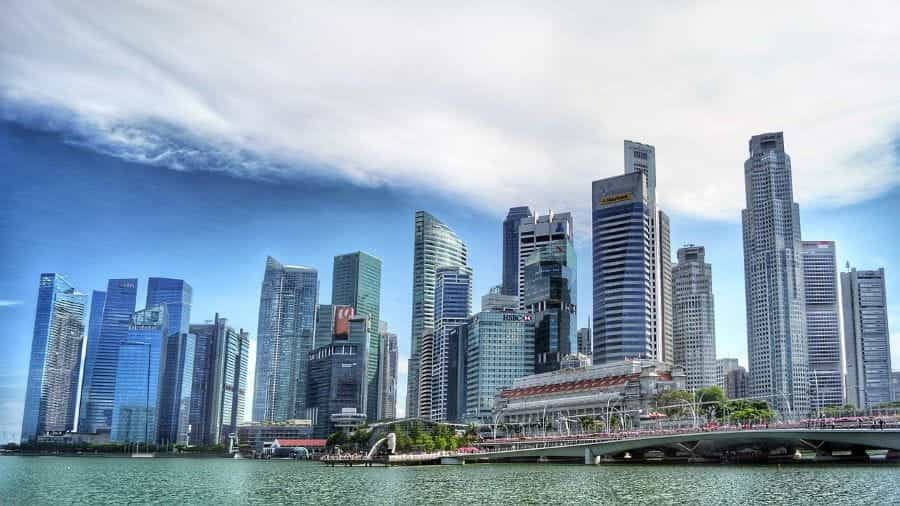The Development of Gambling in Singapore
Asian gambling has traditionally been restricted to premier destinations such as Macau but the industry is booming in Singapore despite its strict regulations. The rise in the popularity of the gambling industry in Singapore may seem surprising to some, but the stringent rules surrounding the industry have enabled the authorities in the region to capitalize on the large amounts of tourism and revenue the industry can generate.

The gambling industry in Singapore has been growing steadily in recent years as restrictions have been eased. Some will worry now that the pandemic will set the industry back in the region. ©cegoh/Pixabay
Singapore is renowned worldwide for having tight laws around all facets of public and private life. For example, those living in the city-state are not even allowed to chew gum or use e-cigarettes. If either of these is even found in the possession of a citizen, the will likely receive a substantial fine to dissuade them from doing so.
These laws have also stood in the way of legalized gambling in the country over previous years. The practice was only recently legalized, but the government of the region is now suggesting that its form of tightly regulated gambling is, in fact, safer than the alternative. If the state did not sponsor this pass time, citizens would likely participate in unregulated and illegitimate forms of gambling, which could cause a myriad of issues.
Not only is legalized gambling safer, but it is also a highly valuable industry the authorities can cash in on. By levying taxes on the licensed casinos that are present in Singapore has generated huge amounts in tax revenue for the government. The venues turn over multiple billions each year and the high tax rate has ensured both operators and authorities can profit from the practice.
The History of Gambling in the Region
Singapore is now one of the most successful and lucrative gambling markets in the entirety of Asia, even though the industry was only established in 2008. The regulator in Singapore, the Casino Regulatory Authority, was inaugurated just over 10 years ago which was followed two years later by the casinos that are allowed to operate in the country.
The decision was made to legalize the practice because it was ultimately seen as futile to try to police the illegal gambling industry. Gambling has been a popular pursuit in Singapore for centuries, even though it has been prohibited for much of this time.
The country’s difficult relationship with betting began in the early 19th century when British colonizers banned the operation of underground gambling dens in the region as well as cockfighting. This was all implemented when the British rulers of the region implemented their first regulatory bills in 1820.
These restrictions were built up further in the 1900s when the government implemented a series of bills that were designed to further regulate the practice. These bills included the Private Lotteries Act of 1952 and the Common Gaming House Act of 1961. These outlawed lotteries in the region, as well as the common gaming houses that were widespread across Singapore.
This all changed in 2006 when the first legislation was brought in that began to lift the ban on gambling in the state. The Casino Control Act was passed this year that gave the government the ability to grant special licenses that allowed physical gambling locations to operate legally in Singapore. Such licenses have only been granted to a small number of casinos, but these now rank as some of the largest and most extravagant that exist anywhere in the world.
It is still illegal for anyone in Singapore to place bets on anything anywhere other than these locations. The government maintains that this strict stance is to limit the incidence of illegal and unregulated gambling that occurs in the country.
The ban on gambling in other locations also extends to the online gambling market. The Remote Gambling Act that was passed in 2014 prohibited online gambling in Singapore unless it is provided by licensed operators. Authorities worry that easy access to online gambling could result in rampant gambling-related problems within the population so decided to heavily regulate the practice.
It does seem as though this bill will be subject to change in the coming months, however. It appears as though the government is planning to more clearly define the rules surrounding the legality of online gambling in Singapore. Currently, a loophole in the legislation means that it is not technically illegal for online casinos to offer services to Singaporeans if the casino is based in another country.
This loophole may be closed in the future, as the authorities are unable to regulate these operators as they work externally to Singapore’s laws and controls.
Whilst the government has made decisions to make gambling licenses inaccessible to most operators that wish to work within the region, the growth of the industry has been undeniable.
The growth began with the opening of the first casino in Singapore, the Resort World Casino. This location was given the green light to commence business in the state in 2010 despite the laws in the region that typically seek to limit activities of vice. There is seemingly a growing trend for the legalization of pastimes that have traditionally been seen as immoral. First, dancing in bars was allowed by the authorities, then a Grand Prix was given the go-ahead, and now, even gambling is allowed.
Industry Damaged by COVID-19
Despite the huge strides that have been made to regulate and profit of the gambling industry in Singapore, it has not been exempt from the widespread issues that have come about in the wake of the outbreak of COVID-19.
The pandemic forced the closure of casinos and resorts in the state, which has hugely damaged the revenue these businesses have been able to generate. The pandemic has, therefore, jeopardized the position of the market. Many have discussed the Singaporean gambling market as one to challenge the traditional Asian powerhouses such as Macau, or growth markets such as the Philippines.
Recent forecasts have suggested that the overall damage to the market in 2020 as a result of the coronavirus could cause a 65% decline to the overall revenue for the year. Whilst this decline is predicted to be less than what has been seen in Macau or even Las Vegas, it is not expected to recover as quickly as these more established markets.
It is believed by industry experts that the recovery will be impeded by Singapore’s greater distance to its feeder markets that either Macau or Las Vegas. Singapore is more reliant on long-haul international travel to generate much of the revenue from the casinos located within its borders. Currently, the widescale restrictions on travel are disrupting much of the footfall to the region and this is likely to be the case for some time.
Operators in the region, such as Genting Singapore limited have reported significant losses during the period that has been affected by the coronavirus. This operator, stated recently that during the second quarter of 2020, it experienced an SGD163.3 million net loss. This is the rule rather than the exception for the region, as all facets of the gambling industry in Singapore have suffered as a result of lockdown measures. It now remains to be seen whether the industry will be able to bounce back effectively in the wake of the pandemic.
The industry in the typically conservative region has come on leaps and bounds in recent years, but this could all be effectively undone by the fallout from the pandemic. Tourism is gradually returning, and with that, so is footfall to the country’s casinos. The largest casinos in the region are now being re-opened as restrictions are lifted and regulators are hoping that this will create more revenue and taxes from the industry.



